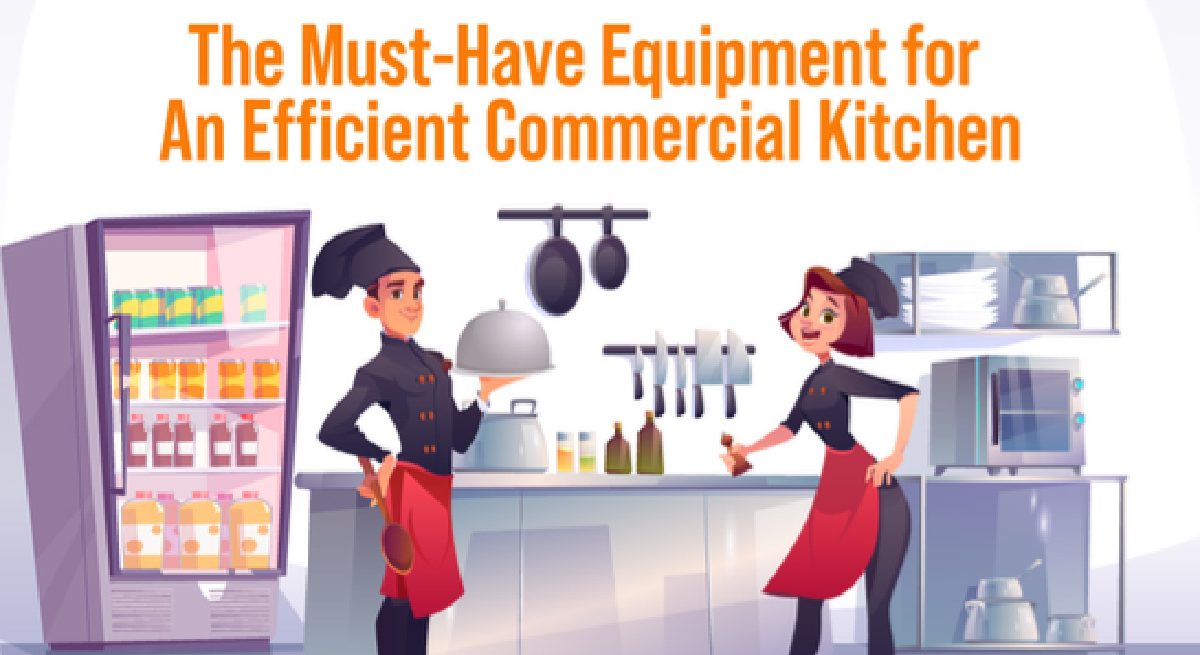The Must-Have Equipment for an Efficient Commercial Kitchen (Infographic)
3 Min Read
Start-up food service businesses should carefully consider the type of kitchen they will require. You will have to make this investment along with creating your team, securing your location and, of course, getting the ingredients to create the food you sell.
Commercial kitchens differ from home kitchens. A busy restaurant requires industrial-grade equipment. Our checklist has the essential equipment for an efficient kitchen, in addition to a list of tips for running your kitchen safely and profitably.
Refrigerators – Commercial
Providing fresh, safe food to your customers requires a commercial-grade refrigerator to store food efficiently. Your business needs the right size and capacity of a commercial fridge to stay profitable. Obviously, this will depend on the size and nature of your business.
Consider the features of different types of refrigerators to find one that meets your needs. Unlike a coffee shop, which would only need dairy and creamer products, a sandwich shop would need to store meats, produce, dairy and more.
Freezer for Commercial Use
If you do not intend to serve only fresh food at your establishment, a commercial freezer is also necessary. Commercial freezers can store more perishable items than home freezers. Your food is organised, so you can keep track of it more easily. By following the first in, first out (FIFO) methodology of food inventory management, you reduce waste and ensure that your food stays safe and tastes good. Choose a freezer with adequate storage space for your expected demand, easy organisation and easy access to food. Take into account whether your freezer will be on display as well.
The Commercial Oven
The commercial oven can be used for baking or roasting fresh, mouthwatering dishes. Whatever your needs, whether you are baking, roasting or simply heating food, you want a commercial oven that is dependable, efficient and compliant with safety regulations. Your premises must also comply with installation regulations.
Commercial Range Products
Your restaurant's range is often its most important piece of equipment. This is the area where fresh meals are prepared as well as a list of cooking methods. Either gas or electric, you need a range that meets your needs.
Your choice should reflect your cooking style and the layout of your kitchen. In addition to size, a few burners won't be sufficient for a large dining room. It makes no sense to take up too much kitchen space with a large range in a restaurant with limited seating.
The Commercial Sink: More than one commercial sink may be required. Make sure you choose sinks that are appropriate for your commercial business.
The Compartment Sinks: With individual sinks for specific purposes, you can create the perfect configuration for every kitchen.
Disposal Sinks: To dispose of solid food waste safely.
Sinks for handwashing: For safe food handling.
The portable sink: A portable hand washing sink for tight spaces or outdoors.
Business at its Heart
If you don't have a well-equipped commercial kitchen, you can't meet high standards for both customer satisfaction and employee safety.
Equipment for Restaurant Kitchens: Considerations
If you decide to purchase restaurant equipment, consider these factors:
- Ownership costs (TCO)
- Agreements for maintenance and warranties
- Dimensions and functionality
- Shipment and delivery
- Efficiency in energy use
- Tips for managing restaurant kitchens
- Employee feedback
- Simplify your menu
- Implement an efficient inventory system
- Set up specific workstations in the kitchen
- Hygiene and food safety
- Invest in your employees
Overall, your menu should be the most important component of your kitchen equipment checklist. How you serve and what you serve is what will determine your success or failure. As a result, you need to ensure that your kitchen is equipped with everything you need to serve your customers high-quality food. Creating a scalable kitchen will allow you to expand as your business grows.


